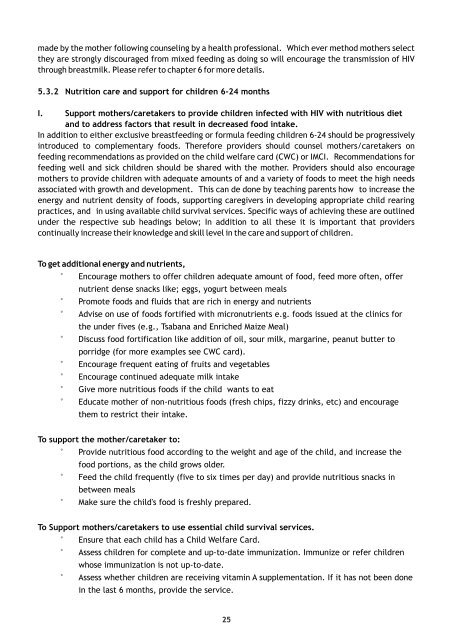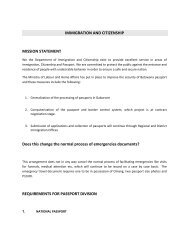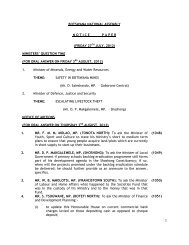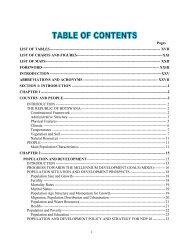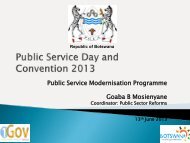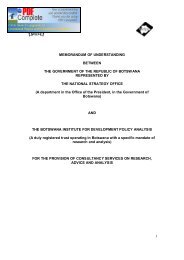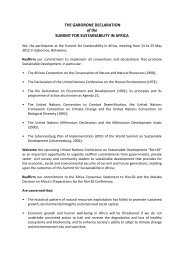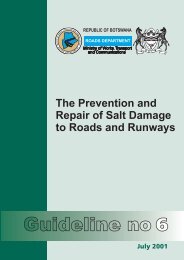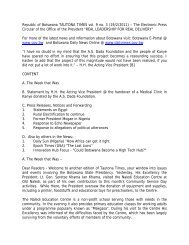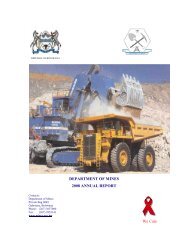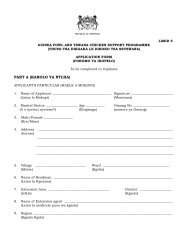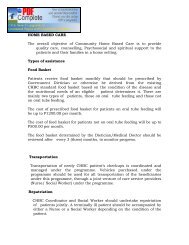National Nutrition and HIV/AIDS Guidelines for Service Providers of ...
National Nutrition and HIV/AIDS Guidelines for Service Providers of ...
National Nutrition and HIV/AIDS Guidelines for Service Providers of ...
Create successful ePaper yourself
Turn your PDF publications into a flip-book with our unique Google optimized e-Paper software.
made by the mother following counseling by a health pr<strong>of</strong>essional. Which ever method mothers select<br />
they are strongly discouraged from mixed feeding as doing so will encourage the transmission <strong>of</strong> <strong>HIV</strong><br />
through breastmilk. Please refer to chapter 6 <strong>for</strong> more details.<br />
5.3.2 <strong>Nutrition</strong> care <strong>and</strong> support <strong>for</strong> children 6-24 months<br />
I. Support mothers/caretakers to provide children infected with <strong>HIV</strong> with nutritious diet<br />
<strong>and</strong> to address factors that result in decreased food intake.<br />
In addition to either exclusive breastfeeding or <strong>for</strong>mula feeding children 6-24 should be progressively<br />
introduced to complementary foods. There<strong>for</strong>e providers should counsel mothers/caretakers on<br />
feeding recommendations as provided on the child welfare card (CWC) or IMCI. Recommendations <strong>for</strong><br />
feeding well <strong>and</strong> sick children should be shared with the mother. <strong>Providers</strong> should also encourage<br />
mothers to provide children with adequate amounts <strong>of</strong> <strong>and</strong> a variety <strong>of</strong> foods to meet the high needs<br />
associated with growth <strong>and</strong> development. This can de done by teaching parents how to increase the<br />
energy <strong>and</strong> nutrient density <strong>of</strong> foods, supporting caregivers in developing appropriate child rearing<br />
practices, <strong>and</strong> in using available child survival services. Specific ways <strong>of</strong> achieving these are outlined<br />
under the respective sub headings below; In addition to all these it is important that providers<br />
continually increase their knowledge <strong>and</strong> skill level in the care <strong>and</strong> support <strong>of</strong> children.<br />
To get additional energy <strong>and</strong> nutrients,<br />
° Encourage mothers to <strong>of</strong>fer children adequate amount <strong>of</strong> food, feed more <strong>of</strong>ten, <strong>of</strong>fer<br />
nutrient dense snacks like; eggs, yogurt between meals<br />
° Promote foods <strong>and</strong> fluids that are rich in energy <strong>and</strong> nutrients<br />
° Advise on use <strong>of</strong> foods <strong>for</strong>tified with micronutrients e.g. foods issued at the clinics <strong>for</strong><br />
the under fives (e.g., Tsabana <strong>and</strong> Enriched Maize Meal)<br />
° Discuss food <strong>for</strong>tification like addition <strong>of</strong> oil, sour milk, margarine, peanut butter to<br />
porridge (<strong>for</strong> more examples see CWC card).<br />
° Encourage frequent eating <strong>of</strong> fruits <strong>and</strong> vegetables<br />
° Encourage continued adequate milk intake<br />
° Give more nutritious foods if the child wants to eat<br />
° Educate mother <strong>of</strong> non-nutritious foods (fresh chips, fizzy drinks, etc) <strong>and</strong> encourage<br />
them to restrict their intake.<br />
To support the mother/caretaker to:<br />
° Provide nutritious food according to the weight <strong>and</strong> age <strong>of</strong> the child, <strong>and</strong> increase the<br />
food portions, as the child grows older.<br />
° Feed the child frequently (five to six times per day) <strong>and</strong> provide nutritious snacks in<br />
between meals<br />
° Make sure the child's food is freshly prepared.<br />
To Support mothers/caretakers to use essential child survival services.<br />
° Ensure that each child has a Child Welfare Card.<br />
° Assess children <strong>for</strong> complete <strong>and</strong> up-to-date immunization. Immunize or refer children<br />
whose immunization is not up-to-date.<br />
° Assess whether children are receiving vitamin A supplementation. If it has not been done<br />
in the last 6 months, provide the service.<br />
25


